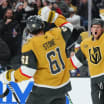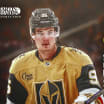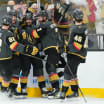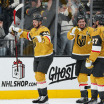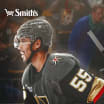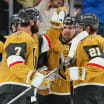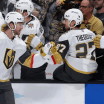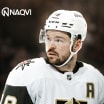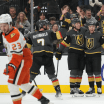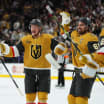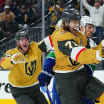Get to Know Assistant Coach John Stevens
New addition to VGK staff caught up with Insider Gary Lawless
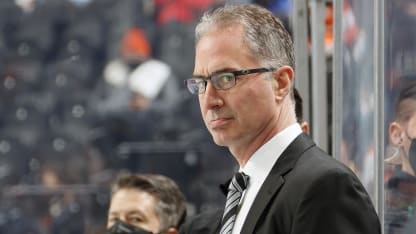
© Len Redkoles
Bruce Cassidy is definitively, in both name and authority, the top knock in Vegas. His new assistant coach John Stevens, however, has logged lots of time as a head coach in both the NHL and AHL. Stevens has been bench boss with the Philadelphia Flyers and Los Angeles Kings in the NHL as well as a Calder Cup champion head coach with the AHL's Philadelphia Phantoms. Stevens also won two Stanley Cups as an assistant coach on Darryl Sutter's staff with the Kings.
Stevens built a reputation over his lengthy playing career as a team-first individual. He knew his role and was driven to succeed in it. He has carried over that same approach to coaching.
Cassidy is considered one of the best head coaches in the NHL and coupled with the roster in Vegas, positions on his current staff were coveted. Stevens is highly regarded and the match made sense for both men. Cassidy gets a qualified assistant who can see the world through a head coach lens. Stevens gets a chance to learn and win standing on the bench beside Cassidy.
"I've been an assistant for some really good coaches," said the 56-year-old Stevens. "I mean I worked with Ken Hitchcock, Terry Murray, I've worked with Darryl Sutter, Rick Bowness, and Jim Montgomery. After being a head coach, I think I have the ability to just look at the situation and see what holes need to be filled. Whereas the support needed is that I can make the staff the best that it can be and not try to overstep my bounds. I enjoy helping with the game plan, I enjoy getting that relationship with the coaches, and I enjoy getting an understanding of what the team needs and doing that to the best of my abilities. I have no problem, I think have always considered myself a really good team guy, and a really good teammate. I think I was as a player, and I've brought that to the coaching profession as well."
Cassidy retained assistant coaches Ryan Craig and Misha Donskov while bringing in Stevens and goalie coach Sean Burke.
Born in New Brunswick on Canada's East Coast, Stevens moved to Ontario at an early age and excelled in hockey playing three seasons of Major Junior with the Oshawa Generals.
Drafted by the Flyers in the third round, Stevens played in parts of 14 pro seasons totaling 53 NHL games with zero goals and 10 assists. His last pro seasons were with the Phantoms and he stepped from the ice to behind the bench. Parts of two seasons as an assistant led to his first head coaching job with the AHL's Phantoms.
Stevens began the 2006-07 season as an assistant coach with the NHL's Flyers before being named head coach later in that campaign after Ken Hitchcock was fired.
Stevens took a break from watching Golden Knights rookie camp this week to talk hockey, music and fishing.
GL: If I asked what it means to be a coach, what comes to mind for you?
JS: Probably the first things that come to mind are a mentor and a teacher. I mean I think that's the thing I enjoy most about coaching. I spent a lot of time in the American League, and the biggest enjoyment of that I got was trying to help players get better so the team could get better. Obviously winning is a big part of that. If you could do that, helping young guys become a big part of it, that was always a big thing for me. It's no different than at an NHL level. When it's young guys or older guys, if you can help them improve their game, I think that's your job, but ultimately, you're doing it to make the team better. That's what drives me to be a coach.
GL: I'm always struck by the teams that are -- and that might be because they're winning- but the teams that win, the coaching staff is pretty happy. For the teams that don't, there could be some grumbling. I don't know if it's a bad relationship that causes the losing, or the losing causes the fraying in the relationship. What's your viewpoint?
JS: I think that the game is always more fun when you're winning, but that being said that I've been on some really good teams and some really good runs. I've won championships, there have always been periods of conflict. I think it can be healthy, I mean I grew up with three older brothers where there was lots of conflict. I think good staff that has trust in the relationships, there's going to be those situations. You don't want people to be yes men and agree all the time. I think you need to challenge each other, but at the end of the day, I do think you need to be united, and you need to make sure you have each other's back. Again, I've been fortunate, I think I've been at a really good stop everywhere I've been. I have a lot of good friends in the business, and I look forward to working with Bruce here. I think he's a really bright guy, I've seen him from afar and we've kind of followed the same path, in terms of playing juniors against each other and being coaches for a really long time, and he's had a lot of success doing things that he's done, obviously, everyone does things a bit differently. So, I'm looking forward to learning from him as well as the guys who have been here since day one. I think Vegas has built a brand overnight. I think Misha and Craig are left over from the staff that's been here from day one, so they have a player understanding of what it means to be a Vegas Golden Knight and play in this city and in front of this fan base. I'm really excited even though I've been in the game a long time, I'm excited about this new challenge and opportunity.
GL: What kind of a junior player was Bruce Cassidy?
JS: I remember Bruce when I came in, he was in Ottawa, my first year was his second year. They won the league and the Memorial Cup, he was paired with Brad Shaw. He was tremendous and just a really good competitor and a really high hockey IQ, processed the game at a really high level. High-end offensive player, that's really memorable of him. I know his career was cut short by injuries. He really was a high-level thinker at the junior level.
GL: You've coached in LA and Dallas which are established markets but in non-traditional settings. Sometimes does it strike you where the game has gone?
JS: It does, I think that they've done an amazing job on growing the game, and you see that with the youth hockey. You see kids coming from all parts of the country, and they're so-called nontraditional markets. I know in LA, when I spent time there, it was amazing how the hockey was at the youth level. I think you've seen that in Phoenix and you see that in Dallas and you certainly see that in Vegas now. I've been amazed to see what they've been able to do here so quickly, and it makes this a special place. I think the fan base and people who live here really embrace this team because it was born here. It wasn't a team that was moved here or relocated from somewhere else, it originated here in Vegas. I think that people really embrace that, and it's been impressive to watch. Unfortunately, I was in LA when you guys made the playoffs in the first year, and we were at the brunt of an expansion team beating us out. So that didn't go over well, and I think it was a real wake-up call for the rest of the league, on how good Vegas was. To see a team come in and have success right away, it has been tremendous, and I think it has really helped build the brand. And I think the league has done a good job on changing the rules, having competent people in place, you can advantage of the rules and make a competitive team. I think it's really good for the game, to grow the game, having it so spread across North America now, where you can really, doesn't matter where you are in the country, you're not that far from NHL hockey.
GL: When you look at the group of defensemen that you're going to have here, what excites you about working with that group?
JS: You know what, it's impressive, I've been very fortunate. I went to LA and made a young defense with some veteran guys. I was a big part of being there for a while, and helping guys like Doughty, Martinez, Muzzin, and McNabb, and all of those guys who developed their game and become really good players. We had really good depth and different types of players and I see that here. You aren't really reliant on the top four even though you have elite defenseman here. I think the depth of the position is good, I think you have really good size and really good mobility. I really feel fortunate to work with a group like that. I think the potential for this group is high, I think that you're gonna have success in this league you need a group like that to put you over the top. So, they've done a great job with assembling the defense here, certainly, with Pietrangelo, he's a high-end guy and a young kid like Theodore who is on his way to becoming a really high-end star defenseman. Then you have some really good players around, I think it's a really strong group of defensemen and a strength of our team.
GL: Former players often say the thing you miss the most about playing hockey is the juice you get from competing, and the closest thing to that is coaching. Was that a big lure for you to become a coach?
JS: I think so, when I played, I wasn't a talented guy like Butch was. I was more of a competitive guy and I had to figure out a way to compete and make sure I was fit and can keep up with the pace, and detail was important. Because of that, it opened the door for me to be a coach, and work with young players as I got later in my career because I played for a long time. I think it's a privilege to work in hockey and certainly at this level. Dealing with athletes that are this committed, and this good at their trade, and that playing a game at this level. I think it's the competition of the game that we love. It's trying to win as a group, is the most exciting for me. If you can't do it playing, then coaching is the next best thing.
GL: Pickup truck or car?
JS: I just got a new F-150, so I'm driving a truck.
GL: What was on the radio when you drove in today?
JS: The Highway. Country radio.
GL: Do you like to read?
JS: I do, I probably don't read as much as I should. I like to read more informative stuff, stories about athletes, people that are successful, and those types of things more than I do than read novels. I like to get up and read the news every day.
GL: Do you have a family?
JS: My wife and I have been married 31 years, two boys. John and Nolan, John is 28 and Nolan is 26, they both hockey in the American League. John is with Vancouver playing with Abbotsford, my son Nolan signed with New Jersey, playing with Utica.
GL: What are those conversations like? Do you get off the ice and check your phone and see that one of them just finished, and call him right after the game? Do you guys talk hockey a lot?
JS: We do, but it's more of a dad and a father figure than it is from a coach. They have great coaches where they go, but I do like to watch from when they were young. My wife used to videotape games because in the minors you travel a lot, and on the buses for long rides. I always watched their games afterward, and they loved watching their games. It was more about just being able to see their games and share conversations about how their game went. It's just more about it than anything, I can certainly offer advice, but it is by no means hard-pressed coaching. When I talk it's more about how they think the game went and they might ask my opinion of what I thought. They're both good players and good students of the game, and they both are fortunate to get some good coaches around them. I can be more of a dad than a coach.
GL: Fish or Golf?
JS: You know what I love to fish, and I used to golf a lot. When I had kids, I stopped golfing. So I think I'll start golfing again, but I only play once a year so I'm not very good right now.
GL: What kind of fishing?
JS: I grew up on Lake Erie, so we did a lot of bass fishing, lake trout fishing but now I love near the ocean and fishing offshore is totally different. Now it's a lot of flounder fishing down there and I try to get out tuna fishing once a year. It's a long day, you've got to go six to eight hours to get out there usually. The ocean lends itself to all types of fishing. Growing up on the lake like I did, if the rod is bending, then I'm happy.

